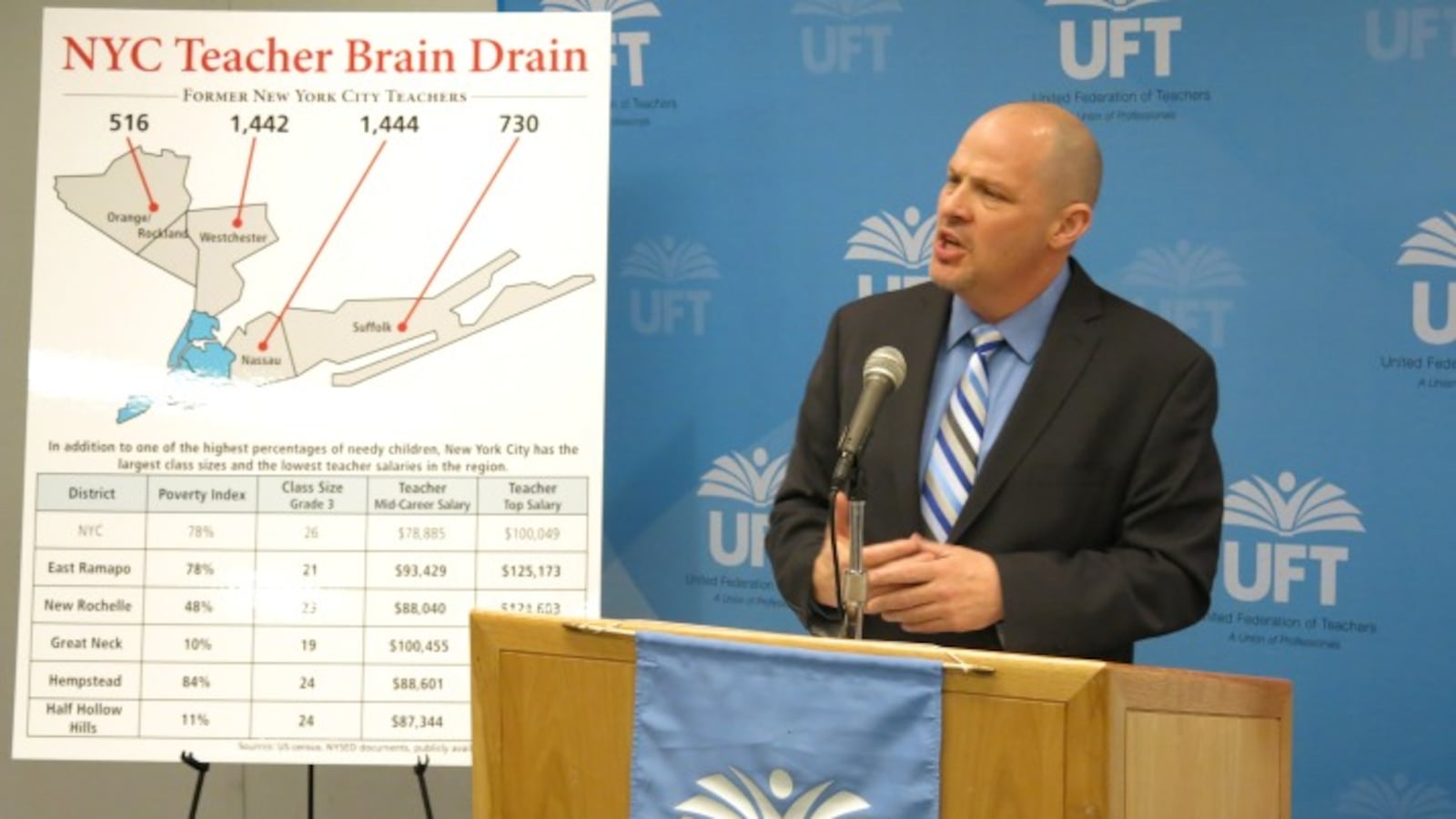As the head of the teachers union pushes for raises in private contract negotiations with the city, he argued publicly Wednesday that educators are fleeing to districts with better pay.
United Federation of Teachers President Michael Mulgrew has mostly kept a low profile during the initial weeks of the new administration, which is trying to forge new contracts with all the municipal unions. But on Wednesday, Mulgrew broke his relative silence to argue that many city teachers are quitting, including experienced ones, and seeking higher pay and better working conditions in suburban schools.
While the share of teachers leaving the system has actually declined over the past decade, Mulgrew’s remarks signaled an effort to build public support for higher teacher wages at a moment when he could demand more than $3 billion in back pay for his members.
“We constantly are hearing from our critics and some of the budget hawks about whether the city can afford to pay teachers raises,” Mulgrew told reporters at UFT headquarters. “To us, the question really is, can the city afford not to?”
After its contract expired in 2009, the teachers union became stuck in a bargaining impasse with the previous administration and so pinned its hopes for a new contract on the next mayor. Though the union did not endorse de Blasio in the primary election, Mulgrew quickly backed the him after his victory. Later, he came out in support of the new mayor’s signature plan to expand prekindergarten, and did not pile on recently when critics pounced on de Blasio for approving dozens of school space-sharing plans.
On the issue of retroactive pay, de Blasio has said the city cannot afford the full $7 billion that the municipal unions seek, at least without the unions making serious cost-saving concessions. The budget proposed by the mayor last month set aside just $1.4 billion that could be used for labor settlements, according to the city’s Independent Budget Office.
If the city agrees to grant the UFT retroactive raises to match ones that other unions received in past years, that will impact how much money the city has for new settlements with the other unions, said Doug Turetsky, the IBO’s chief of staff.
“It’s a complicated set of interrelated negotiations and budgeting,” he said.
Though Mulgrew kept to his promise Wednesday not to publicly negotiate the contract, his claim that some teachers are being driven from the system by uncompetitive wages, large class sizes, and “ridiculous chores” mandated by the previous administration could be seen as an argument for better contract terms.
He noted that the number of teachers with six to 15 years of experience who voluntarily resigned has nearly doubled since 2008, which he called a “whole new phenomenon” in the union. He also said that a recent random survey taken by more than 900 teachers showed that a quarter are considering leaving the system within three years.
The union also said that roughly 4,600 teachers left New York City schools during the decade ending in 2012 and moved to schools in nearby counties where mid-career salaries tend to be higher and class sizes lower.
That argument is not new. A UFT report from 2004 said that many experienced teachers are “recruited by nearby suburban schools offering higher salaries, smaller classes, adequate resources, and a more professional working environment.”
Despite the recent uptick in experienced teachers who are quitting, the city’s overall school-staff attrition rate — which includes retirements, resignations, and other reasons for leaving — has fallen over the past decade. The rate dropped from 13 percent in 2003 to 6.4 percent last year, according to UFT figures.
The percentage of new teachers who leave within five years has also declined — from 46 percent in 2004 to 36 percent last year. And the share of teachers with five or fewer years of experience plunged from 44 percent in 2003 to 21 percent last year. Bloomberg administration efforts to retain teachers, along with the job-depleting recession, have both been cited as causes for those changes.
Charles Brecher, research director of the Citizens Budget Commission, a business-backed research group, said Mulgrew was “selective” in the teacher-turnover facts he highlighted. He also pointed out that less than 200 of the city’s roughly 75,000 teachers left for schools in other parts of the state last year.
“I wouldn’t say that’s an epidemic,” said Brecher, who thinks the city cannot afford full back pay for teachers.
Still, Mulgrew appears to have a receptive audience in de Blasio, who briefly departed from talk of his pre-K and after-school expansion plan at a press conference this month to say the city is “hemorrhaging good teachers.”
“Our teacher retention rate is a real problem,” he said.
Devora Kaye, a Department of Education spokeswoman, said in a statement Wednesday that keeping teachers from leaving is a priority.
“We plan to do our best to support our teachers because we believe in the importance of retaining our best educators,” she said.

